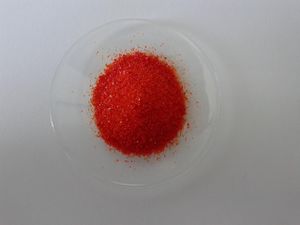Potassium ferricyanide
From Sciencemadness Wiki
Not to be confused with potassium ferrocyanide.
 K3[Fe(CN)6] on a watchglass.
| |
| Names | |
|---|---|
| IUPAC name
Potassium hexacyanoferrate(III)
| |
| Other names
Red prussiate of potash
Prussian red Tripotassium ferriccyanide Tripotassium iron hexacyanide | |
| Identifiers | |
| Jmol-3D images | Image |
| |
| Properties | |
| K3[Fe(CN)6] | |
| Molar mass | 329.24 g/mol |
| Appearance | Dark red/red-orange crystals |
| Odor | Odorless |
| Density | 1.89 g/cm3 |
| Melting point | 300 °C (572 °F; 573 K) (Decomposes) |
| Boiling point | (Decomposes) |
| 464 g/L (20 °C) | |
| Solubility | Soluble in acids Slightly soluble in alcohols |
| Vapor pressure | ~0 mmHg |
| Hazards | |
| Safety data sheet | AcrosOrganics |
| Flash point | Non-flammable |
| Related compounds | |
| Related compounds
|
Prussian blue Potassium ferrocyanide Sodium nitroprusside |
| Except where otherwise noted, data are given for materials in their standard state (at 25 °C [77 °F], 100 kPa). | |
| Infobox references | |
Potassium ferricyanide is an iron coordination complex with the formula K3[Fe(CN)6].
Contents
[hide]Properties
Chemical
Reaction with a strong acid, such as conc. hydrochloric acid will release hydrogen cyanide:
- K3[Fe(CN)6] + 6 HCl → 6 HCN + FeCl3 + 3 KCl
Physical
Potassium ferricyanide is a deep red solid, soluble in water.
Availability
Potassium ferricyanide can be bought online.
Preparation
Potassium ferricyanide can be made by bubbling chlorine through a solution of potassium ferrocyanide.
- K4[Fe(CN)6] + ½ Cl2 → K3[Fe(CN)6] + KCl
Projects
- Classic photography
- Ferroxyl indicator solution
- Make fake blood
- Make potassium cyanide
Handling
Safety
Potassium ferricyanide has low toxicity, but solutions tend to stain.
Reaction with very strong acids may release hydrogen cyanide which is exceedingly toxic.
Storage
In closed bottles, far away from strong acidic vapors.
Disposal
No special disposal is required, though try not to dump large amounts at once.
References
Relevant Sciencemadness threads
Categories:
- Chemical pages without CAS Registry Number
- Articles without EBI source
- Chemical pages without ChemSpiderID
- Chemical pages without DrugBank identifier
- Articles without KEGG source
- Articles without InChI source
- Articles without UNII source
- Articles containing unverified chemical infoboxes
- Chemical compounds
- Inorganic compounds
- Potassium compounds
- Iron compounds
- Cyanides
- Polyatomic ions
- Coordination complexes
- Cyanide complexes
- Materials unstable in acidic solution